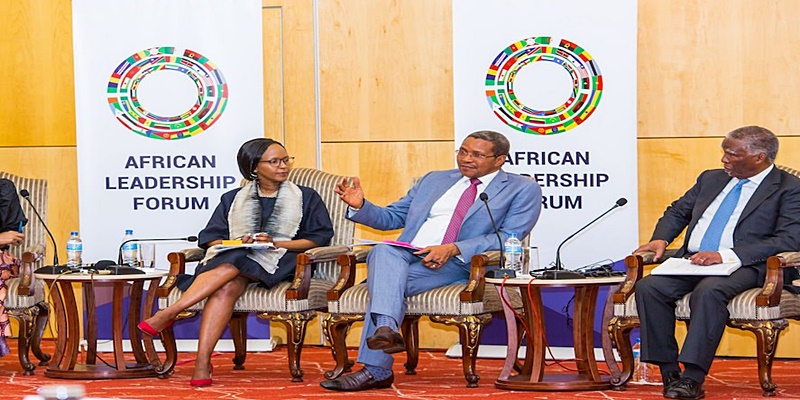Statement of the African Leadership Forum 2023

The seventh African Leadership Forum (ALF) was held in Accra, Ghana, from 25th to 26th May 2023, under the theme “Promoting Intra-Africa Trade to Unlock Agricultural Potential in Africa”.
Under the overarching theme (“Promoting Intra-Africa Trade to Unlock Agricultural Potential in Africa”), the Forum deliberated on the three sub-themes, namely
1) unlocking agricultural potentials in Africa,
2) the market as a driver for fostering agricultural productivity in Africa,
3) the role of Africa’s partners in supporting the success of the AfCFTA.
Considering the opening remarks, keynote address, official opening statement, and deliberations at the plenary session and the three closed sessions, the statement of the African Leadership Forum 2023 is as follows:
Introduction
Africa is a continent of unlimited opportunities, a growing youth population, and optimism. Political stability, collective political will, and political actions are foundations for transforming intra-Africa trade.
The African Leadership Forum 2023 is convening when the agriculture sector in Africa is under pressure from geopolitical conflict, climate change, and covid-19. These external shocks have exposed Africa’s food vulnerability, and the continent cannot continue to be defined by these shocks.
The establishment of AfCFTA is a game changer in driving the trade integration agenda in Africa, creating the world’s largest free market, and ultimately setting the stage for industrialization and prosperity.
Africa needs to focus on agri-business rather than agriculture. As many factors are at play, the former (agri-business) encompasses agriculture simultaneously with many other aspects. Therefore, the sector requires a multifaceted approach across multiple stakeholders, including ministries beyond that of agriculture.
Climate change
The current and future effects of climate change are a wake-up call for Africa to reorient its agriculture development agenda. Many best practices that have transformed the African agriculture sector are available to learn from and scale up.
Interventions can include technological-based, from introducing country-specific technology and innovation in adoption (climate-smart technologies) to diversifying farming systems.
Complementary non-technology interventions include evidence-based policymaking, tapping climate change financing, and advocating for compensation from large polluters.
Access to agriculture financing
Access to affordable finances is necessary to facilitate expanding private sector participation in the agriculture sector. This requires policies that de-risk lending to the sector (formalising agricultural land, introducing land banks), and central banks role in facilitating carbon trade financing as well as incentivizing regional and local banks to syndicate large loan portfolios for the sector.
Africa can also consider incentivising market entry for venture capital funding, insurance products, trade financing, and commodity markets. The latter can start with commodities that Africa largely consumes. Intermediary finances such as guarantees, savings and credit societies, investment banks serving the sector, and credit facilities that cater for the needs of women and youth have proven to accelerate access to finance in some African countries.
Subsidies remain a relevant policy intervention. However, they take resources away from competing development areas and are unlikely to reach all in need. In the future, Africa will need to transition from subsidies to a commercial-based financial ecosystem.
Access to markets
Despite increasing global preference for African food globally, access to markets remains a challenging experience. Efforts can be directed towards investing in advisory services to smallholder farmers, phytosanitary measures and physical and information infrastructure that will enhance interconnectivity. Investing in Artificial Intelligence (AI), robotics, and digital long-distance communication will simplify complex trade logistics.
When addressing trade barriers, African countries cannot be preoccupied with sentiments of winners and losers. Countries need to commit to trading among themselves, invest in knowledge exchange and eliminate trade barriers as among the means to accelerate rural communities’ participation in the regional and global value chains.
Robust private sector capacity in responding to trade opportunities is also vital in transforming intra-Africa trade. Governments can identify, incentivize and facilitate large private sector entities to invest in agriculture.
Specialization in value chains at the regional level and even within countries will revolutionize productivity. Value chain mapping will inform the market on geographical areas where production is more efficient and competitive, which in turn should facilitate the movement of capital. However, trade liberalization should not allow the smuggling of goods from outside Africa.
Development cooperation with partners
Africa needs to synchronize development cooperation with partners by prioritizing projects that raise productivity capacities rather than food aid and emergency supplies. Reference is made to infrastructure development (transport, water, and energy), and access to finance (finnovation, digital finance, blockchain technology, introduction and expansion of commodity and capital markets).
Support to capacity development need to prioritize value addition to the existing agricultural exports, as well as extending the trade arrangements such as the African Growth and Opportunity Act (AGOA), which can potentially raise specialization within the African textile industry.
